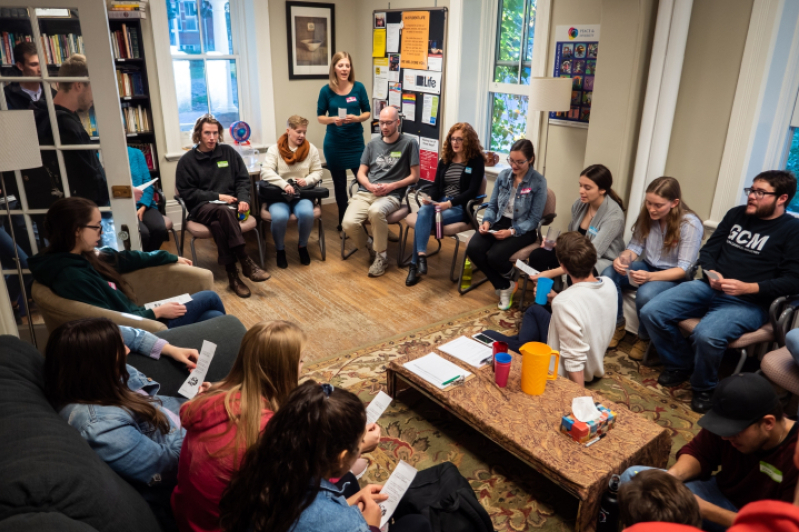
A few decades ago, renowned U.S. universities such as Harvard and John Hopkins used to brim with activities from Christian fellowships. Many churches purchased properties near the campuses as meeting points, providing students with free food and Bible studies. The campus ministries not only touched the lives of students, but also helped shape campus culture. However, all this has quietly gone away.
The Decline of Campus Fellowships: From Boom to Bust
U.S.-based Chinese scholar, Dr. Tao Ray, who was formerly a director at Harvard’s research lab, shared recently that the fellowships that once dotted the campus neighborhoods have gradually disappeared. Churches have been unable to afford to keep the fellowships as donations dwindled, eventually selling the properties to estate developers who repurposed them into cafes, restaurants, or dormitories. Take Boston for example, high land prices have made it nearly impossible for churches to redeem their properties for gospel purposes.
“American campus fellowships were very active a couple of decades ago. When I was in school I passed many Bible Study sites,” said Tao, “but now, they are disappearing one by one, and mission ministries are basically wasting away.” Tao believes that the left shift in American campus cultures is directly related to the decline of Christian campus mission ministries.
The Left is eager to promote its ideas and continues to influence students through education and culture. Tao said: “The left not only controlled the curriculum content, they also pushed their agenda on campuses through a plethora of non-profit organizations. Many leftists are also generous donors to these organizations, supporting their spread of values” By contrast, many Christian churches have become less committed to giving, focusing more on their own internal preaching and Bible studies while neglecting support for campus fellowships.
The Spirit of Giving: Left vs Right
“The passion and spirit of giving the Left displays is what we Christians need to learn from,” Tao said. He mentioned that many leftist professors not only write lectures but also devote themselves completely to their non-profit organizations to push far-left ideology. Compare that with the minimal investments Christians pay to mission-oriented ministries and a lack of basic attention to campus fellowships.
Rev. Boli Zhang resonated deeply with this observation and shared additional statistics in support. “This election season, the Left was way ahead in donations and giving. Harris had over a billion dollars for her campaign, while Trump had about 300 million,” he said. “The fund difference is not from the big money donors, but an accumulation of small donations from countless ordinary leftist supporters.” Rev. Zhang points out that Christians should learn from the Left’s spirit of giving. Whether financially or in action, Christians should be more involved and show greater enthusiasm.
The Importance of Campus Fellowships & Challenges
Rev. Zhang emphasized that campus fellowships are an important bridgehead for evangelism. Years ago, it was common for churches to be actively involved on college campuses through fellowships, providing opportunities for students to engage in Bible study and fellowship gatherings. One campus fellowship near Washington D.C., for example, could gather up to three hundred people at a time.
However, in recent years, the challenges campus fellowships face increased by the day. It’s not just an issue of donations and funding, there is also the pressure coming from society and the political environment. Rev. Zhang notes that many international students from mainland China are afraid to join church activities because it might affect their scholarships or job opportunities back home. These external stresses add to the load that makes campus evangelism so hard these days.
Even so, Tao urges Christians to not retreat, but to rise up to the occasion. He believes: “The harder the times are, the more we Christians need to stand up. The declination of student ministries has directly influenced the healthy development of campus culture, and has diminished the depth of the gospel’s reach.”
Rebuilding Campus Fellowships Brick by Brick
Facing the current situation on campus, Tao decided to start change personally. He opened the subscription function of his X account, and promised to donate all subscription income to Christian campus fellowship ministries. He invites fellow Christians to support this cause: “If you know any organizations or churches that have a campus fellowship, recommend them to me. I hope to do all that I can to support this important work.”
Rev. Zhang adds: “Every church has the responsibility to support Christian campus fellowships, whether that means offering money or people. Campus fellowships are not about chasing short-term profits, it is about sowing seeds for the long-term spread of the gospel. Although some churches may feel that investing in campus fellowships is ‘not worth it’ because students leave after graduation, it is still the mission of spreading the gospel, and that itself is worth doing.”
The Gospel Rebuilds Campus Culture
Education forms not just personal values, but is key to forming the values of the entire nation. Tao points to Proverbs 22:6, “Start children off on the way they should go, and even when they are old they will not turn from it (NIV).” He believes that Christians need to re-influence campus culture from the family, church, and society.
American campus fellowships were once an important field in spreading the gospel, yet current trends show that it is wasting away. As Tao said, “Brick by brick, we can gradually reestablish the campus fellowships. We must not give away the education battleground to the far-Left and their non-profits.” This is the responsibility every Christian must carry.






